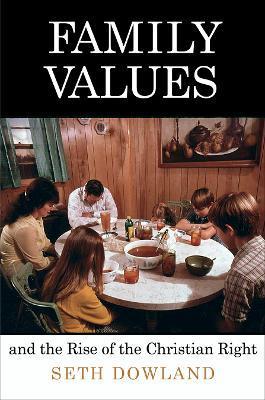Family Values and the Rise of the Christian Right

Family Values and the Rise of the Christian Right
During the last three decades of the twentieth century, evangelical leaders and conservative politicians developed a political agenda that thrust family values onto the nation's consciousness. Ministers, legislators, and laypeople came together to fight abortion, gay rights, and major feminist objectives. They supported private Christian schools, home schooling, and a strong military. Family values leaders like Jerry Falwell, Phyllis Schlafly, Anita Bryant, and James Dobson became increasingly supportive of the Republican Party, which accommodated the language of family values in its platforms and campaigns. The family values agenda created a bond between evangelicalism and political conservatism.
Family Values and the Rise of the Christian Right chronicles how the family values agenda became so powerful in American political life and why it appealed to conservative evangelical Christians. Conservative evangelicals saw traditional gender norms as crucial in cultivating morality. They thought these gender norms would reaffirm the importance of clear lines of authority that the social revolutions of the 1960s had undermined. In the 1970s and 1980s, then, evangelicals founded Christian academies and developed homeschooling curricula that put conservative ideas about gender and authority front and center. Campaigns against abortion and feminism coalesced around a belief that God created women as wives and mothers--a belief that conservative evangelicals thought feminists and pro-choice advocates threatened. Likewise, Christian right leaders championed a particular vision of masculinity in their campaigns against gay rights and nuclear disarmament. Movements like the Promise Keepers called men to take responsibility for leading their families. Christian right political campaigns and pro-family organizations drew on conservative evangelical beliefs about men, women, children, and authority. These beliefs--known collectively as family values--became the most important religious agenda in late twentieth-century American politics.PRP: 232.11 Lei
Acesta este Pretul Recomandat de Producator. Pretul de vanzare al produsului este afisat mai jos.
208.90Lei
208.90Lei
232.11 LeiIndisponibil
Descrierea produsului
During the last three decades of the twentieth century, evangelical leaders and conservative politicians developed a political agenda that thrust family values onto the nation's consciousness. Ministers, legislators, and laypeople came together to fight abortion, gay rights, and major feminist objectives. They supported private Christian schools, home schooling, and a strong military. Family values leaders like Jerry Falwell, Phyllis Schlafly, Anita Bryant, and James Dobson became increasingly supportive of the Republican Party, which accommodated the language of family values in its platforms and campaigns. The family values agenda created a bond between evangelicalism and political conservatism.
Family Values and the Rise of the Christian Right chronicles how the family values agenda became so powerful in American political life and why it appealed to conservative evangelical Christians. Conservative evangelicals saw traditional gender norms as crucial in cultivating morality. They thought these gender norms would reaffirm the importance of clear lines of authority that the social revolutions of the 1960s had undermined. In the 1970s and 1980s, then, evangelicals founded Christian academies and developed homeschooling curricula that put conservative ideas about gender and authority front and center. Campaigns against abortion and feminism coalesced around a belief that God created women as wives and mothers--a belief that conservative evangelicals thought feminists and pro-choice advocates threatened. Likewise, Christian right leaders championed a particular vision of masculinity in their campaigns against gay rights and nuclear disarmament. Movements like the Promise Keepers called men to take responsibility for leading their families. Christian right political campaigns and pro-family organizations drew on conservative evangelical beliefs about men, women, children, and authority. These beliefs--known collectively as family values--became the most important religious agenda in late twentieth-century American politics.Detaliile produsului











